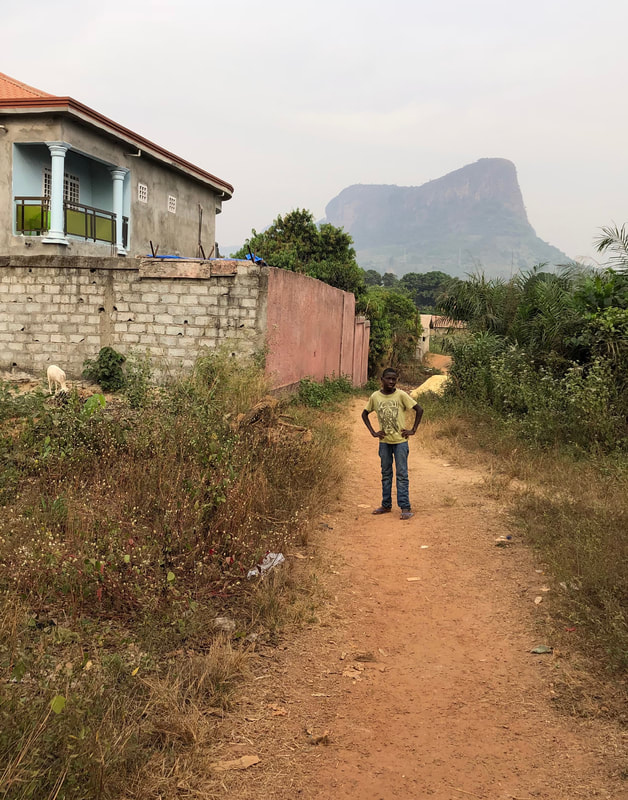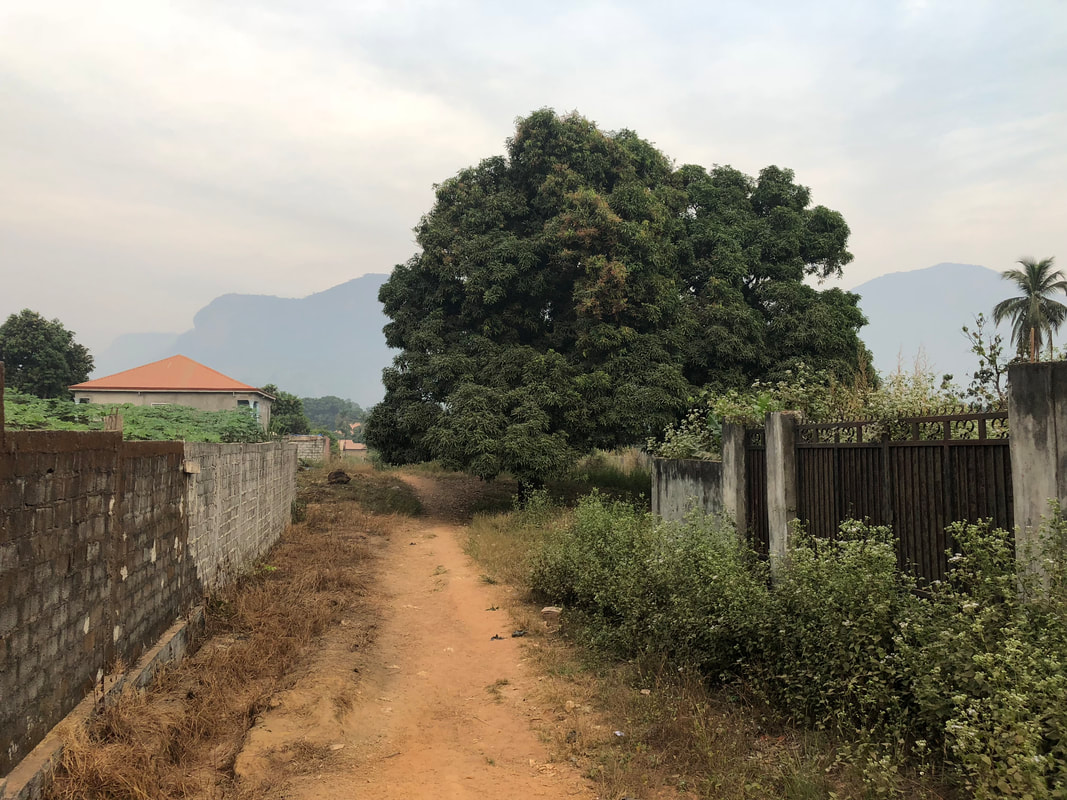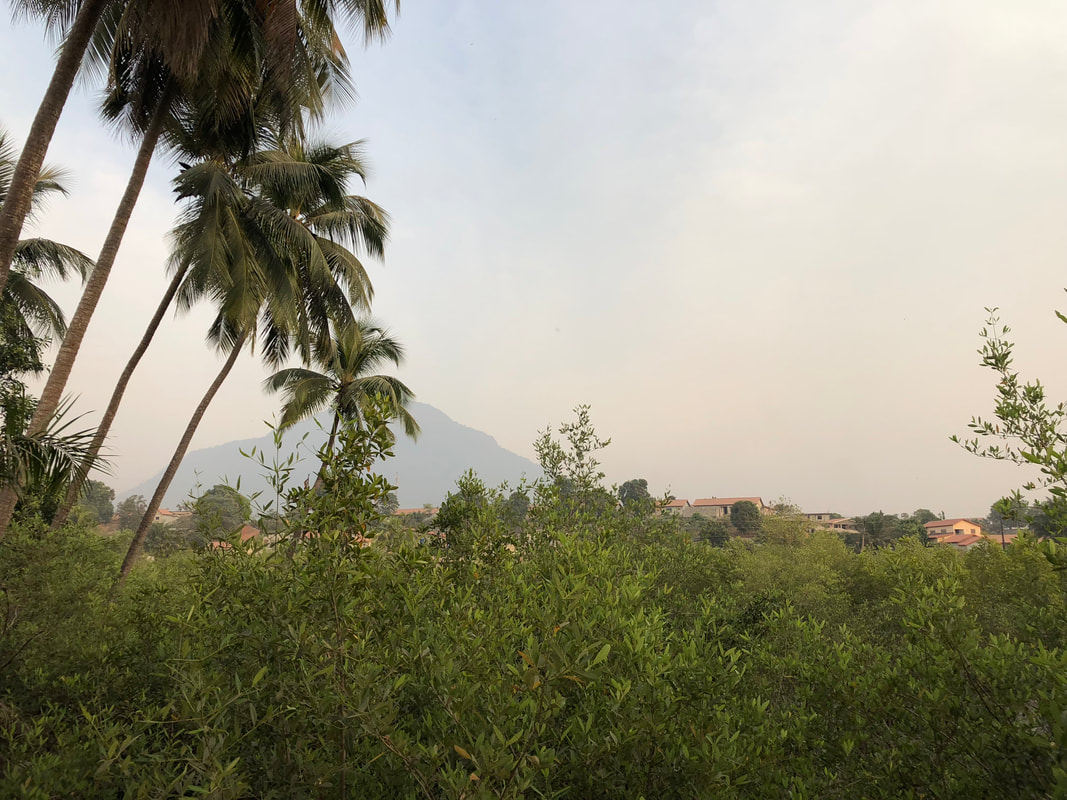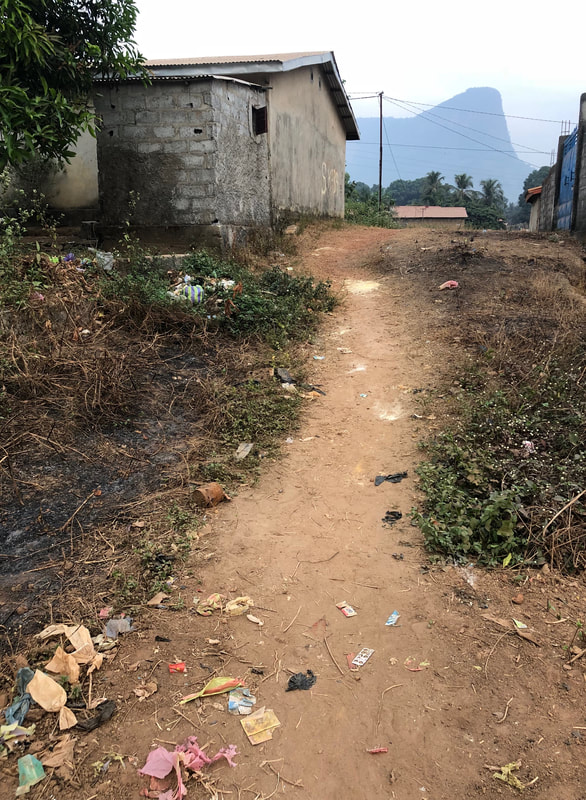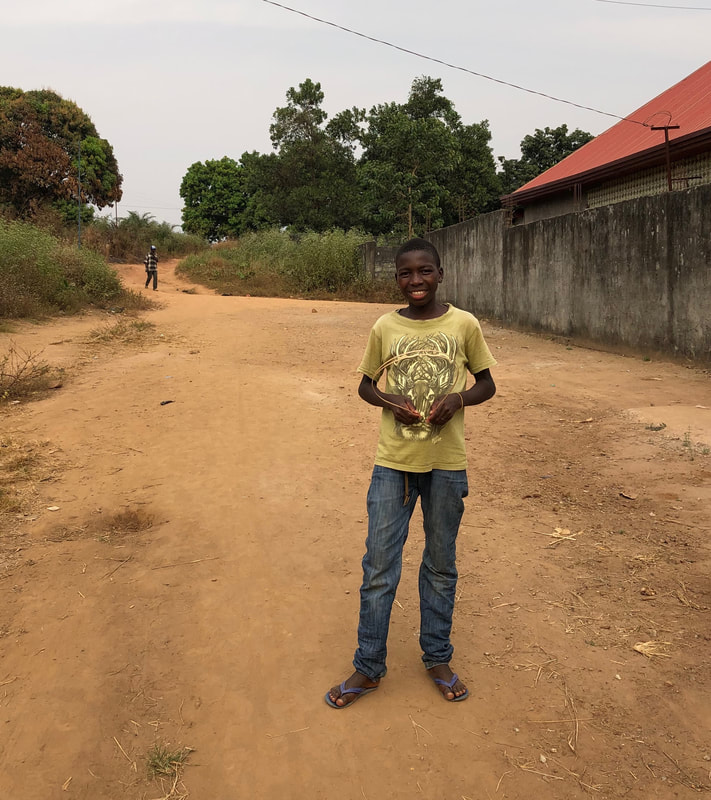|
A trip to Guinea to study dance (or, in the end, drum) was always tacked on to the return trip to Ghana that I knew I needed to make; as I’ve explained in a previous post, the idea of going there formed immediately after my last return from Ghana in 2000, and since that time, Guinea always remained a part of my vision for a return trip to Africa. But by the time I was actually going… just like going to Ghana by now felt not so much like something that I wanted to do, but something that I needed to do, it was somewhat the same for Guinea. Yes, I was certainly looking forward to spending time with my favorite drum teacher, and yes, I was very much looking forward to the generally slower pace of life and the simpler lifestyle that I knew I would find pretty much anywhere in West Africa – as compared to America. But also… by the time I went, so many years after that dream to be there formed… going to Guinea, like returning to Ghana, had become just another step I knew I needed to take along my path – I just knew, and had known, that it was necessary for me to go, and see what happened. While I was hopeful that I would like it there, I do generally go into any new experience without expectations, and I was not necessarily attached to any particular outcome being associated with the trip. …And perhaps all of this explains much of why once I finally had gone, I actually did not feel disappointed when the reality of my situation there was… well… for me… just not a desirable one. This does not feel like an easy post to share. For one thing, one’s experience simply does not always provide the most comfortable story to tell. But more importantly (and what led to much hesitation over whether it was worthwhile to even share the Guinea story), I loved my hosts dearly, and in writing this next post or two, I felt plenty of misgivings about whether I was being as respectful or polite towards them as I would ideally wish to be. …But ultimately, I always seem to choose honesty and openness over diplomacy or tact; and I found that those things that it would be nice to somehow just gloss over, those things that made it most clear that this situation just wasn’t the right fit for me (not for a long stay, anyhow), were so central to my experience that I simply could not tell the story of my stay in Guinea – with my usual dose of honesty and openness – without including them (and why tell it at all if I’m not going to be open and honest?). Let me jump right in by getting one of the worst parts for me out of the way, as it’s the part that I have felt the most uncomfortable writing about – and therefore would prefer to just “rip the band-aid off,” so to speak. ...While I did, keep in mind, cherish my time with my teacher Alisco, and while I did love him and his family dearly… as the population around the compound increased, living in a compound full of men (and loud men at that) made me realize how much I have grown accustomed to living alone, having my own clear mental space, and how much I absolutely love to be in my own peace and quiet. I had been very much relishing my time completely alone in Ghana, and now it was quite an adjustment, once more and more people began coming around, to be cohabitating with a very vocal bunch. And by “people” coming around, I actually mean men – all men – no women or children except for the occasional much-welcomed visit from Alisco’s wife, who lives at their house in Conakry, or the occasional appearance of an 11-or-12-year-old boy, Abwaca, who rapidly became my very favorite person in the country. And by “a very vocal bunch,” I mean… it honestly became a perpetual source of amazement to me how they could possibly have so much to always say to one another (and in such loud tones!). Of course, as my Susu was mainly limited to greetings, names of fruits, and a few other basics that helped me get by, I had no idea what they were actually talking about. And… full disclosure… to provide a more comprehensive depiction of the noise situation… if it wasn’t the constant talking that I found so remarkably… stunning, let’s say – in a pretty true sense of the word, then it was the cellphones – ringing – relentlessly – just blowing my mind how many times in any given hour these phones would go off – I had never heard anything like it! Each man had a smartphone set to ring to the first few bars of a chosen song, and it wasn’t long before each particular song (just the first line or two repeated over and over, mind you) was driving me absolutely bonkers! Like the talking, this was so constant that it became a real wonder to me how it was even possible. The town of Dubreka, too, was far bigger and noisier than I had been imagining it. Though I generally go into all travels without expectations, I realized now that, based on what I had heard of it, I had indeed been envisioning a much smaller, more rural town (as well as a quiet, less populated home). Now that I was here, I could see that this wasn’t the kind of peaceful living I would want from a long stay somewhere in Africa. Relative to life in Conakry, sure, Dubreka was peaceful, but relative to that simple life I had had in the bush that I so often associate with being in Africa… no, not so peaceful. Not only did this not feel like the right place for me, but it really didn’t feel like the right time, either. Here I was, with my favorite master drum teacher, with hours on end to spend in a private lesson – pretty intense lessons, going at my own pace, with three professional players (who would drive out from Conakry) playing the other parts… and all I honestly wanted to do was continue with my writing retreat – and in that way process the couple weeks I had just spent revisiting my past in Ghana; I did not feel at all drawn to focus on practicing for my drum lessons. (And to be honest, even though, yes, the drum classes overall were amazing… West African drumming is a very communal affair, and while it’s certainly helpful, as a student, to learn a rhythm with people who can already play very well the other parts into which you have to fit your own… in many ways I enjoyed playing with my own community back in Santa Cruz much more than these professional guys.) Nor did I feel like drumming was important enough to me to be the sole reason for staying in a situation I wasn’t enjoying; as much as I love drumming, it was also just a way to be there, a means to spend time in Africa. I wasn’t there just to drum but to live within the culture, had yearned, for years, for a taste of the cross-cultural experience through which I had learned so much, grown so much, during those formative times I had spent in Ghana in my early twenties. Now I started to really appreciate what I had in Ghana, how easy it was for me to be there, and for me to feel that I could exist within the culture rather than just alongside it – largely due to having a common language. Whereas my first time in Ghana I had pretty instantly fallen in love with its culture in general, in Guinea, I couldn’t tell how I felt about the culture, because I couldn’t communicate enough with its people to tap into it. When I was a college student during my first trip to Ghana, one of my academic advisors, a wise and wonderful Nigerian man, had often stressed that a culture is so well revealed through its language that learning its language is a huge and crucial step towards understanding its worldview. And in studying Twi during that trip, I found it to be a language structured so fascinatingly differently from my own – conveying the very different way of thinking, mindset, and perspective that would surely develop in the Ghanaians growing up speaking it – that I could see the truth of that statement. But in my current situation… while at first I had been excited to learn some Susu, it soon became clear that a deeper dive beyond greetings and other basics was not going to be a particularly easy task, considering that the educational technique consistently employed by everyone outside of Sekou and Alisco – all the young men often hanging around the compound as well as the drummers from Conakry who came out to join us for my drum lessons – was to throw a whole long sentence at me and then wait expectantly for a response; somehow I did not find this technique at all helpful. Sekou, by far my favorite Susu teacher, was the only one who seemed to understand the need to go word by word, and when it was just the two of us at the house, we managed quite well together despite our lack of a common language, using a sort of sign language and objects and sometimes a tiny bit of French that I could somewhat make out – or imagined I could, anyway, which seemed good enough. (And Sekou, thankfully, was the #1 person who was generally at the house with me, Alisco’s most trusted family member, whom he had raised like a son and trusted enough, he told me, to watch over any student he brought to Guinea – if Alisco wasn’t around, as he often had family matters to attend to back in Conakry, then I had Sekou by my side.) Alisco, meanwhile, remained the one person with whom I could speak English. Although everyone around me was speaking only Susu, my incomprehension of French began to feel like a real disadvantage, as I knew it could have been a bridge, and before long, I felt that I would not want to return to a Francophone country in West Africa, at least not for any significant length of time, without at least first learning French. But now did not feel like the time to focus on learning a new language; it felt like the time to continue to go deep within myself through the writing – and between drum classes and finding peace and quiet only on rare occasions, this just wasn’t happening. The language barrier also amounted to a lack of independence, and this meant, for one thing, because I was being very well cared for, that I was never left alone – always there was someone around in case I needed something. I was indeed grateful that they were taking such good care of me, but… I really like, and am used to, having plenty of time alone, and perhaps especially now, coming out of that time completely alone with myself in Ghana that I had so been enjoying… this just wasn’t working for me. …And then there was the plastic situation. This was the other main factor playing a role in my decision not to stay, but it is such a big topic that I am going to give it its own post (because yes, I have learned that blogs are not like books, and I’m trying to keep each post relatively short for you). To be continued in Part Two…
2 Comments
Flatatatowartz
3/7/2020 12:16:18 pm
Do you (and did you) generally write for yourself or with the intent of sharing your thoughts/words/ideas/experiences with others? Just curious. And I can totally understand the want/need for serious alone-time.
Reply
Aharona
3/14/2020 05:17:01 pm
Mostly I write for myself – to know the self and process my experiences. It feels like a very intimate way to be with myself – and one that has been with me since childhood, so there’s a steadiness to it, a sort of stability. But then taking that original writing and turning it into these blog posts to share with you all was another thing that, yes, I was intending to do. On that front, there were definitely hurdles to get over in the process of putting my writing out there – putting myself out there… but in the end, so far it has always felt like a very positive experience to share. And to get back to your question… ultimately... I feel like there’s really no difference between writing for myself and writing for others, as essentially we are all One… Anyway, more on this topic of writing is actually coming in another post. :) Thanks for sharing this journey with me, old friend.
Reply
Your comment will be posted after it is approved.
Leave a Reply. |
AuthorAharona Shackman has used writing as her primary practice for connecting with the Self pretty much since she learned to write. With the commencement of this blog, she is now beginning to practice the sharing of some of her writing... Categories
Archives
September 2020
|
